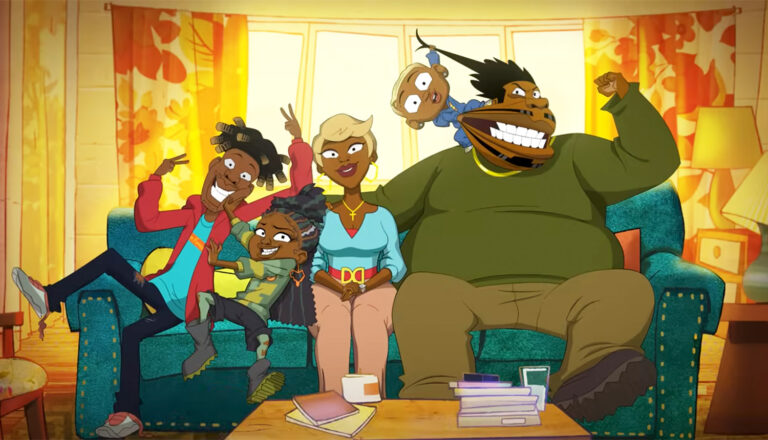
Good Times
Netflix takes a classic sitcom, Good Times, and turns it into a vulgar, violent, sexually-charged TV-MA show.

Good grief, Charlie Brown says. And maybe he has a point. But grief sure doesn’t feel good. In fact, it can mess you up something awful.
Just ask Jen, a 40-something real estate agent whose husband was killed by a hit-and-run driver—leaving her with two sons and zero sense of closure. And even though she’s trying to move on, it’s not easy—not with the three-alarm rage boiling underneath her pinched face and folded arms.
What helps? Chocolate chip cookies. The Facts of Life. A little marijuana. And, most especially, her new friend, Judy. In Jen’s world filled with pitying glances and unanswered questions, Judy helps her laugh, and cry and even sleep.
But will it be enough to keep their friendship going under some very difficult circumstances? Secrets, and Jen’s grief-fueled anger, bring a whole new set of problems to the table.
Netflix’s Dead to Me is characterized as a black comedy, and indeed it’s plenty dark. But poking through its grim folds we find some unexpected insights, and maybe even a kernel of hope and wisdom.
The show unpacks the weird, messy realities of grief, a condition we all process differently. It’s not a one-size-fits-all box that we climb into or out of the same way or on the same schedule. And in this show’s own curious and sometimes barbed style, it offers both advice and hope on how to process our losses and, eventually, to move past them.
Judy’s own cause of grief offers an interesting wrinkle, too. She and Jen meet at a grief workshop, and Judy first says that she lost her fiancée to a heart attack. But when Jen discovers that Judy’s one-time beau is alive and quite healthy, another layer of Judy’s story unfurls: She and her fiancée desperately wanted a family, but Judy kept miscarrying. In flashback, we see Judy after her fifth miscarriage, weeping bitterly in a hospital hallway, her dress stained with blood. She says they ultimately broke up over the painful issue.
When Judy apologizes to Jen for lying and joining a grief support group, even though she didn’t have an “actual thing,” Jen (eventually) corrects her.
“I think it is an actual thing,” Jen says. “Not if a Republican is asking … but you heard a heartbeat, and you fell in love with that heartbeat.” In that moment, Dead to Me reminds us that there’s more than tissue in a pregnant womb: Something special is growing, something worth grieving over.But as the show goes on, it’s clear that more than grief is at work in these characters’ lives. It’s mingled with guilt and self-protection, too.
Given that, perhaps we might be forgiven for grieving a bit over the show itself—or, more fairly, what it could’ve been.
Dead to Me didn’t need to be TV-MA. Everything that makes the show watchable, if not special, is part of its core DNA: Its strong cast (anchored by Christina Applegate and Linda Cardellini), its thoughtful character development and clever writing.
No, the f-words—of which the show has plenty—are unneeded. The drug use we see here serves a purpose, but nothing that dozens of other narrative decisions could’ve done just as effectively. And Jen and Judy’s casual attitude towards sex (especially Jen’s promiscuous behavior after she discovers her husband was having an affair before he died), is almost treated as a political statement.
Furthermore, while Judy seems to be open to all forms of spirituality (joining in on Christian prayers while also using New Age crystals), Jen is dismissive of anything that even hints at a higher being. She openly mocks the pastor leading the grief group where she and Judy met and often rolls her eyes at her church-going business partner—who also happens to be gay.
Again, let me remind you this is indeed a black comedy—thoughtful at times, yes, but bleak as well. It goes in some dark directions that plenty of viewers won’t want to go.
Jen, still furious with Judy for lying to her about what really happened to her husband, needs Judy’s help after her anger leads to the death of someone close to Judy.
Jen points a gun at a man in self-defense but doesn’t fire. She later tells Judy that he was trying to strangle her, and she acted in self-defense. Someone is bludgeoned with a ceramic bird. Jen admits that she burned all of Judy’s possessions in a blind rage. Someone cleans blood stains from the pavement. Judy says a dog drowned itself.
A woman in a bra and skirt cleans herself with paper towels. Judy finds a cigar box hiding weed. People drink wine throughout the show. We learn a father taught his son how to drive before he legally had a permit.
Judy tries to warn Jen that lying will only eat away at her, but she agrees to keep Jen’s secrets anyway. The f-word is heard 35 times, the s-word another five and the c-word once. We also hear “a–hole,” half a dozen misuses of God’s name and one misuse of Christ’s name.
Jen, grieving over the death of her husband in a hit-and-run car accident, meets free-spirited Judy at a grief workshop. The two strike up a curious friendship built on late-night calls and Facts of Life reruns. But when Jen discovers that Judy’s been lying about her own grief, Jen’s furious.
The workshop is led by a Christian pastor who tells attendees that they need to talk about the “f-word: forgiveness.” He says that Jesus forgave, which prompts Jen to lash out by unleashing an angry, graphic depiction of what happened to her husband. “How do you forgive that?” she snaps. We also hear about the pastor’s own experience with grief: How his aunt fell down a flight of stairs while getting a can of soda for him and died “while her 5-year-old son watched.” In flashback, we see Judy in a hospital, blood staining the front of her dress. Several cars display obvious evidence of violent collisions.
Jen’s real estate partner, Chris, is gay—and according to Judy, looks it in the team’s advertisements. Both talk about how “hot” John F. Kennedy Jr. was. Judy reintroduces Jen to marijuana: Jen refuses at first, saying that she’s not a drug person. “It’s not drugs,” Judy says. “It’s a plant,” reminding Jen that it’s legal now. They share a joint while sitting on the beach, both of them getting seriously stoned. They also say that they’d both start smoking if they knew they didn’t have long to live. Both drink wine, too.
Judy lies. Jen weeps loudly while sitting on the toilet and wiping herself. (We see the exposed side of her thigh.) There’s a reference to meditation. Characters say the f-word about 17 times and the s-word twice. We also hear God’s name misused about eight times and Jesus’ name abused once. Someone wears a cross around her neck, and there’s a reference to heaven.


Paul Asay has been part of the Plugged In staff since 2007, watching and reviewing roughly 15 quintillion movies and television shows. He’s written for a number of other publications, too, including Time, The Washington Post and Christianity Today. The author of several books, Paul loves to find spirituality in unexpected places, including popular entertainment, and he loves all things superhero. His vices include James Bond films, Mountain Dew and terrible B-grade movies. He’s married, has two children and a neurotic dog, runs marathons on occasion and hopes to someday own his own tuxedo. Feel free to follow him on Twitter @AsayPaul.

Emily studied film and writing when she was in college. And when she isn’t being way too competitive while playing board games, she enjoys food, sleep, and geeking out with her husband indulging in their “nerdoms,” which is the collective fan cultures of everything they love, such as Star Wars, Star Trek, Stargate and Lord of the Rings.

Netflix takes a classic sitcom, Good Times, and turns it into a vulgar, violent, sexually-charged TV-MA show.

While its protagonist might live a nuanced life, The Sympathizer’s problematic content can’t be described the same way.

Say hola once again to the iconic explorer in this faithful reboot of the children’s series.

Based on a popular video game, Ark: The Animated Series features hungry dinosaurs, bloodthirsty people and plenty of problems.